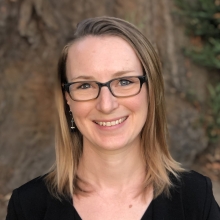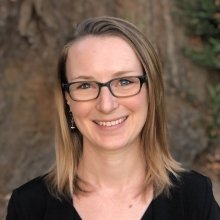
Lowry Kirkby, PhD

Dr. Kirkby obtained her undergraduate degree in Physics from the University of Oxford, and her Ph.D. in Biophysics from the University of California, Berkeley. She completed her postdoctoral research in Neuroscience at the University of California, San Francisco, where she studied large-scale electrical recordings of the human brain to understand how neural circuits are altered in depression and anxiety.
PROJECTS
Neurological disorders: Neurological disorders such as depression and dementia are heterogeneous in their underlying brain dysfunction and symptomatic experience, however, objective methods of subtyping these complex disorders are lacking. As such, patients receive a catch-all diagnosis and undergo a trial-and-error approach to treatment, which often results in chronic disability and long-term suffering. Through the Innovate for Health Fellowship, my goal is to develop analytic methods for patient stratification within the neuropsychiatric or neurodegenerative space that will focus on one or a combination of (i) disease subtyping for objective diagnoses, (ii) personalized treatment options, or (iii) improved understanding of underlying disease neurobiology. To address this challenge, I propose to leverage a biomedical knowledge graph that is currently in development by researchers at UCSF. This approach has the potential to uncover new, high-order structure that may reveal subtle differences across patient subtypes.
Predicting Emergency Department staff shortages during the COVID-19 pandemic using machine learning: Front-line healthcare workers are at high risk of contracting the novel coronavirus. The presence of a sufficient number of healthcare workers at all times during this pandemic is essential for the health of the rest of society. The goal of our study is to develop a machine learning model to predict staff shortages based on healthcare workers’ risk of coronavirus infection. We are partnering with Emergency Department (ED) providers at the University of California, San Francisco (UCSF), who report an immediate need for staff forecasting to help guide personnel resource management. We will combine several sources of data, including patient electronic health records, staff scheduling, personal protective equipment inventory, and a custom-designed questionnaire to quantify healthcare workers’ personal coronavirus risk factors. Our study will help the UCSF ED proactively manage essential staff resources, which has important implications for emergency preparedness, hospital operations, and the survival of patients.

Lowry Kirkby, PhD
UC Berkeley, UCSFDr. Kirkby obtained her undergraduate degree in Physics from the University of Oxford, and her Ph.D. in Biophysics from the University of California, Berkeley. She completed her postdoctoral research in Neuroscience at the University of California, San Francisco, where she studied large-scale electrical recordings of the human brain to understand how neural circuits are altered in depression and anxiety.
PROJECTS
Neurological disorders: Neurological disorders such as depression and dementia are heterogeneous in their underlying brain dysfunction and symptomatic experience, however, objective methods of subtyping these complex disorders are lacking. As such, patients receive a catch-all diagnosis and undergo a trial-and-error approach to treatment, which often results in chronic disability and long-term suffering. Through the Innovate for Health Fellowship, my goal is to develop analytic methods for patient stratification within the neuropsychiatric or neurodegenerative space that will focus on one or a combination of (i) disease subtyping for objective diagnoses, (ii) personalized treatment options, or (iii) improved understanding of underlying disease neurobiology. To address this challenge, I propose to leverage a biomedical knowledge graph that is currently in development by researchers at UCSF. This approach has the potential to uncover new, high-order structure that may reveal subtle differences across patient subtypes.
Predicting Emergency Department staff shortages during the COVID-19 pandemic using machine learning: Front-line healthcare workers are at high risk of contracting the novel coronavirus. The presence of a sufficient number of healthcare workers at all times during this pandemic is essential for the health of the rest of society. The goal of our study is to develop a machine learning model to predict staff shortages based on healthcare workers’ risk of coronavirus infection. We are partnering with Emergency Department (ED) providers at the University of California, San Francisco (UCSF), who report an immediate need for staff forecasting to help guide personnel resource management. We will combine several sources of data, including patient electronic health records, staff scheduling, personal protective equipment inventory, and a custom-designed questionnaire to quantify healthcare workers’ personal coronavirus risk factors. Our study will help the UCSF ED proactively manage essential staff resources, which has important implications for emergency preparedness, hospital operations, and the survival of patients.





